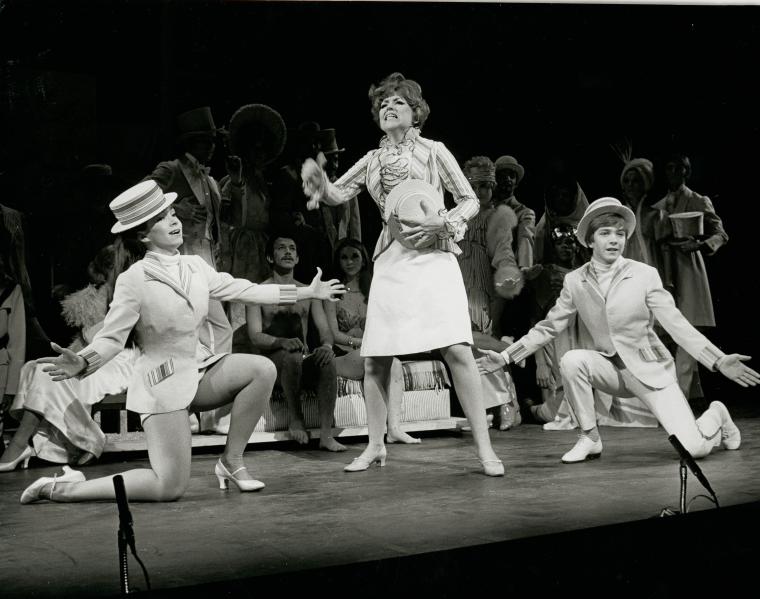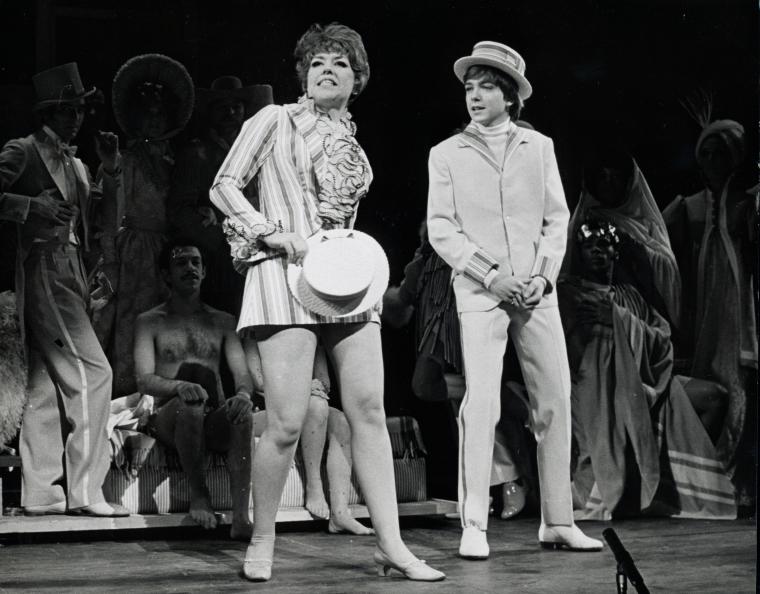Archives
The Lost Musicals: Uncovering the Dorothy Loudon Flops Part One: The Fig Leaves are Falling
What happens to a musical unrecorded? Does it dry up like a raisin in the sun? Perhaps, but fortunately not forever in the case of two flop musicals from the late sixties/early seventies that tried to challenge American sexual mores, that also featured the sublime talents of one of the musical theatre’s incomparable divas, before she played Miss Hannighan in Annie and joined the ranks of the great musical stars.
Many of the classic musicals are introduced to future generations through film adaptations, but some great musicals weren’t turned into films (Candide, She Loves Me), or were made into unsatisfactory films with altered stories and truncated scores (Paint Your Wagon). So, instead, children growing up in Nebraska, or Michigan or—as in my own case—Vermont can learn the great (and, if they’re very zealous fanatics like me, also the lesser) musicals from their cast albums.
After the unprecedented success of My Fair Lady’s album, (which was the best-selling album of 1957 and 1958) record companies realized just how profitable these albums could be. How lucky for those of us who are dying to pore over the cast albums of Donnybrook, Flora, the Red Menace, Greenwillow and The Gay Life that the record companies were so anxious to risk all for a shot at another jackpot that they recorded practically every new musical, even the flops.
But they also recorded the hits, and for many of them, the risk paid off. Cast albums (The Sound of Music, Camelot, Hello, Dolly!) and soundtracks for movie musicals (West Side Story, Mary Poppins) were the top sellers for the first half of the sixties. However, as the country’s taste in music started to shift away from theatre music and toward pop, there wasn’t as a high a demand for a recording of every show, and a few slipped past the radar, including some that truly deserved cast albums!
The Fig Leaves are Falling, with music by Albert Hague (Plain and Fancy, Redhead) and book and lyrics by the popular comedy song writer and parodist Allan Sherman, in his first and last musical opened on Jan 2, 1969 and closed on January 6, 1969. The show focused on a middle-aged man (Barry Nelson) facing a midlife crisis, who mistakes boredom with the conventional suburban lifestyle for boredom with his devoted wife (Loudon) and embarks on an extramarital affair with a free-spirited young woman (Jenny O’Hara) who broadens his outlook and helps him step out of his repressions. Ultimately he realizes that he actually loves his wife and goes back to her, bringing his new perspective into their life together. (The show also featured a pre-Partidge Family David Cassidy as Loudon and Nelson's son.) Coming after shows like Hair and Promises, Promises, this tame story failed to shock, and more damning still, it failed to impress.

However, one element from this show must have stuck in people’s memories—Dorothy Loudon’s performance. Though Loudon had previously gotten some attention for her television appearances, particularly on The Garry Moore Show, she wasn’t a star on Broadway yet and the show had been a total bomb that closed months earlier, but Loudon received her first Tony Award Nomination for this show. Even Barnes had praised her: “The important thing about her is that she is both lovable and vulnerable, so much so that I feel personally affronted at the way the show wastes her.”
If you’re interested in The Fig Leaves are Falling, you can read about it in Ken Mandelbaum’s Not Since Carrie: Forty Years of Broadway Musical Flops but you can’t buy the cast album, because they never recorded one, but if you do want to hear a live recording of the entire show, you’ll find it at the Rodgers and Hammerstein Archive of Recorded Sound, along with other rare recordings from the Loudon Papers, including the controversial disaster/masterpiece, Lolita, My Love, which I’ll discuss in my next post.
For access to these recordings, write to the Rodgers and Hammerstein Archive of Recorded Sound, rha@nypl.org. To learn more about these shows in the Dorothy Loudon Papers, see the finding aid. Inquiries may be directed to the Billy Rose Theatre Division, theatrediv@nypl.org.
"Theater: The Fig Leaves Are Falling: Sherman-Hague Show Is at the Broadhurst." 1/3/1969 available via ProQuest
Read E-Books with SimplyE
 With your library card, it's easier than ever to choose from more than 300,000 e-books on SimplyE, The New York Public Library's free e-reader app. Gain access to digital resources for all ages, including e-books, audiobooks, databases, and more.
With your library card, it's easier than ever to choose from more than 300,000 e-books on SimplyE, The New York Public Library's free e-reader app. Gain access to digital resources for all ages, including e-books, audiobooks, databases, and more.
If you don’t have an NYPL library card, New York State residents can apply for a digital card online or through SimplyE (available on the App Store or Google Play).
Need more help? Read our guide to using SimplyE.

Comments
the fascination of the flop
Submitted by Danielle von Gal (not verified) on December 10, 2010 - 6:20pm
Target audience?
Submitted by Lee Spilberg (not verified) on December 14, 2010 - 9:02am
I'd like to think the best of
Submitted by Diana Bertolini (not verified) on December 14, 2010 - 9:45pm